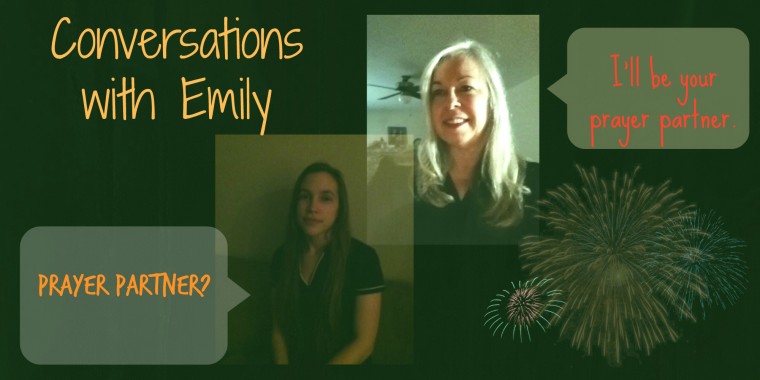
Intentional God-focused Living
It’s not as easy as you might think. Human effort plus some Divine intervention may seem like a slam dunk. But it just doesn’t work that way. There’s a whole lot more to it than just implementing a formula. Read on. . . .
GOING DEEPER WITH GOD: LESSON 6
LOOKING IN THE MIRROR: Where am I in the mix?
PREMISE: God made us for relationship.
There’s a problem in the house, the elephant in the room if you will. It seems fairly easy to be a Christian, but it is a lot harder to live as a committed Christian. Talk the talk and it sounds pretty good. Walk the talk is the bigger challenge.
Look in the mirror. What do you see? If there’s a need for some touching-up, we should get to it and not put it off. But if we don’t care how we look, then there will be little improvement. When we don’t care or are lazy in our walk, then we as Christians are not living up to the name. It should not be this way, we are Christ’s namesake.
So, how does this play out? I’ll share a few of the not-so-nice examples of negative representatives of Christ.
THE PROBLEM
Some wait staff don’t like to serve church groups (I’ve heard this from more than one source). Church groups complain about the service, and they’re known for leaving small tips. (Ouch!) Some people say they are Christians–but they can be difficult. Other Christians are Sunday-only Christians, their belief does not translate into practical out workings in their lives and doesn’t seem to influence their lifestyle choices.
Here are some more unsettling facts. Some Christians are known for being cheap, rude, and overly opinionated. In the public sector, some people have little use for Christians, and these same people prefer to work with nonbelievers. Anyone who has worked for a Christian organization knows how hard it can be for Christians to get along with each other, especially when they have theological differences. I inwardly cringe when I hear someone, newly hired by a Christian organization, speaking with rose colored glasses. I worry their tune will change not too far into it (but I hope not).
Being Christian does not necessarily mean being characterized by the attributes of Christ(ianity), many live more in the flesh than in the spirit. Most likely they don’t keep close enough to the Source, haven’t replenished their spiritual tank, or they have not taken care of some spiritual business that needs attending to including past, personal history.
Am I saying Christians are mean-spirited people? No, I’m not saying that at all. What I am saying is that we as Christians are often blind to our own actions and live with a self-focused mindset far too often. Some have a secular viewpoint in all practical purposes. “What’s in it for me?” can subtlety find its way into any relationship, home, and church. Thankfully this is not always the norm. There are many Christians who do the opposite. Christians who live out their faith in a sensitive and pure way.
Then there’s this sort of behavior too. “They never apologized to me for what they did.” “What they said wasn’t true. I’ll never forget it.” These comments are based in painful episodes and were caused by residual hurt from unfair or unkind treatment. The bitterness is being carried through the years. It is true, there are those who are critical, who look at what people do wrong rather than what they do right and are quick to tell the rest of us. When we are the target, it can be mighty unpleasant and uncomfortable.
I’m not exempt. I’ve received criticism, and I have also said comments better not said. It embarrasses me to acknowledge this about myself, and I know better. Words and thoughts can flow out as a continuous complaint about the unfairness of it all. “Nothing ever turns out right for me!” I used to think, which came from out my frustration with circumstances and people. Sound familiar? And of course, there are the bigger ones like Christians who take a turn for the worse to pursue an immoral life style or a life of self-indulgence. Those are easier to spot.
Question 1: What gives? What’s wrong in our thinking? Why do we do the opposite of what we preach and believe? Why doesn’t Christianity make a bigger and more distinct difference in people’s lives?
It must be that somewhere in the mix there is a separation between a person’s belief and experience, faith and practice. For those who are fairly comfortable in their Christian practices, it may be a bit of a stretch to believe any of this applies to them; they are sincere and devoted in their Christian living and clear in their Christian world view and practical application of it.
Yet I dare say we all are affected and afflicted as well. At times, we find ourselves enmeshed in this Catch 22, caught between a rock and a hard place and not sure why the victorious life eludes us. I listen to people and their take on topics under discussion and then I find myself wondering where the heart is? what does it all mean? I see a strange dichotomy at work in people’s spiritual lives, and I notice the conflicted view. I want more for them, because I know more can be had. But we can be blind to our own inconsistencies.
I hear Christians constantly nagging their mates, and it bothers me. I witness people of faith being short tempered or impatient on a consistent basis, and it concerns me. I see Christian sisters and brothers telling lies or tweaking the truth, and it disappoints me. I see language that is not the best being spoken without any compunction that the content is an affront or in contradiction with their faith, and it causes a sense of shame in me.
QUESTION 2: Have you seen this same problem–Christian inconsistencies, duplicitous behavior, living with a double standard, played out in the church or a Christian organization? How did it make you feel? Why did it bother you?
Why is this? Why am I bothered by these actions? Do I think I am better than them? Worse yet, am I judging them? That’s not it, decidedly not where I’m coming from or the point I am trying to make even though it does sound sort of cranky and “white-washed.” I realize I have no business telling people how to live their Christian lives, that’s between them and God, and I’m not their minister; and for sure, I am not the “spiritual” police, making sure people do what they’re supposed to do. That’s not what I am about.
I also know God works in peoples lives and brings them to a place of dealing with their life according to His ways, their backgrounds, readiness, and their own spiritual growth. What may be sin for me, may not be sin for them in many of the gray areas. So, why? Why talk about these things?
It bothers me for a different reason altogether. Christian behaviors are telling. Even children are known by what they do. Selfish or rude behavior tells me where the person’s heart is. Behavior may display tracks of unconfessed sin, unhealed hurts, spiritual infancy, or self-centered thinking. But most revealing is an underlying callousness towards the living things of God and a lack of respect towards God.
Pure faith, that is tried and true, is easily seen in those who love and serve God in such a way that it even colors their speech and their decisions. Pure faith sweetens the dynamics in their close relationships and infuses the characteristics of God’s ways into their hearts. Somehow they’ve managed free themselves from the contamination.
We live in a sin-stained culture, and it has left its mark on all of us. Like a truck stuck in a mud bog, spinning its wheels but unable to get grip and any kind of traction, we simply can’t break free of this murky madness until we intentionally choose to do so, then go for help, do the hard work, and clean up the mess. This can be through a loving intervention done God’s way and with His help.
The truth is, we can’t possibly love God with all our heart, mind and soul and at the same time continue to treat our Christian brothers and sisters, family members and friends in selfish, or unforgiving ways while keeping a running score of their infractions and injustices towards us. When we harbor resentments, we know there’s a problem in the house (in our spirit).
I find myself a bit skeptical as I watch my Christian brothers and sisters at spiritual retreats and special church meetings. I wonder to myself if the emotional high they are experiencing will impact their lives in the long term. Will their renewed desire for God be long-lasting? My skepticism comes from a place deep inside me. Lasting change will take lasting effort to effect the change.
I have watched these things, true renewal is more than an emotional experience. It takes hard work to change from living for self into becoming who God wants us to be, not into who we think we should be. The two are quite different. We each have our own path to spiritual transformation, and no two look alike. We must remember this and allow others the freedom for God to work in them as He wills.
For internal renewal to be real and permanent, it requires a commitment to change and a desire for something more in our spiritual life. The desire for something long-lasting, dynamic, life-renewing, and real–something we can only find in God when we seek Him with our heart, mind, and soul–is something we doggedly pursue. It has a lot to do with surrendering our way to God and God’s ways.
In an earlier lesson, we looked at our need for God and His desire for an intimate relationship with His beloved children. They, in turn, realize they have a corresponding inner need and a growing capacity for God. We saw that a desire for “being,” the state of real, living relationship, is far more important than service, which is seen in our acts of “doing.” This may cause a reversal of thinking as we shift our focus from our Christian works to following Christ first. In its pure form, Christian service is an outworking of the Christ-life within us.
Next in Series: THE SOLUTION (Going Deeper, Part 7)


